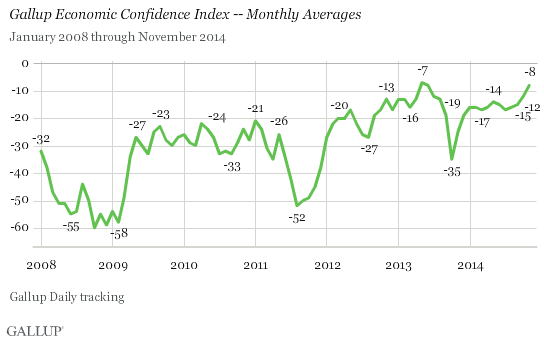The economies
of the world’s nations are on a slow stroll while America has quickened its
pace to a leading role as one of the only bright Northern lights for others to
follow. Improvement is so significant that GNP has been revised upward from
3.5% to 3.9% (As
cited in CNN Money). Other nations are increasingly concerned about lower
inflation and the potential for deflation. The U.S. is doing so well it may start to raise interest
rates in alignment with growth.
Americans
are becoming increasingly positive about their future prospects within the
economy. According to a recent gallop poll consumer confidence rose to -7 which
is the highest it has been in 17 months (Gallop,
2014). The poll is a combination of
how people view the economy. According to the poll 24% said the economy is
excellent while 30% said it is poor leaving the total balance at -7.
The U.S.
economy is also moving forward with some of that growth coming from lower
energy and oil costs. Morgan Stanley’s global economist stated, “Lower energy
costs boost broad economic activity in the near term and fiscal policy becomes
a bit more supportive of growth in 2015” (as
cited in Market Watch). Oil is a significant cost that impacts everything
from shipping to production throughout the economic system.
The economy
is a whole system that incorporates financial metrics as well as difficult to
define human feelings, emotions, and neuro-economic choices. Improvements in
oil and economic conditions are one benefit while improvements in consumer and
investor mood are another. Getting investors and employees on the same page is
terms of investment and skill is beneficial.
Those not feeling positive are
likely suffering from job displacement related to economic transitions in the
market. Using economic hubs as a method to bit size policy to match investment
in business with new learning in job skills to create new products is
beneficial. Fiscal policy should focus on hedging the power of the new found
economic growth to foster competitive clusters that can compete on the international
market.
